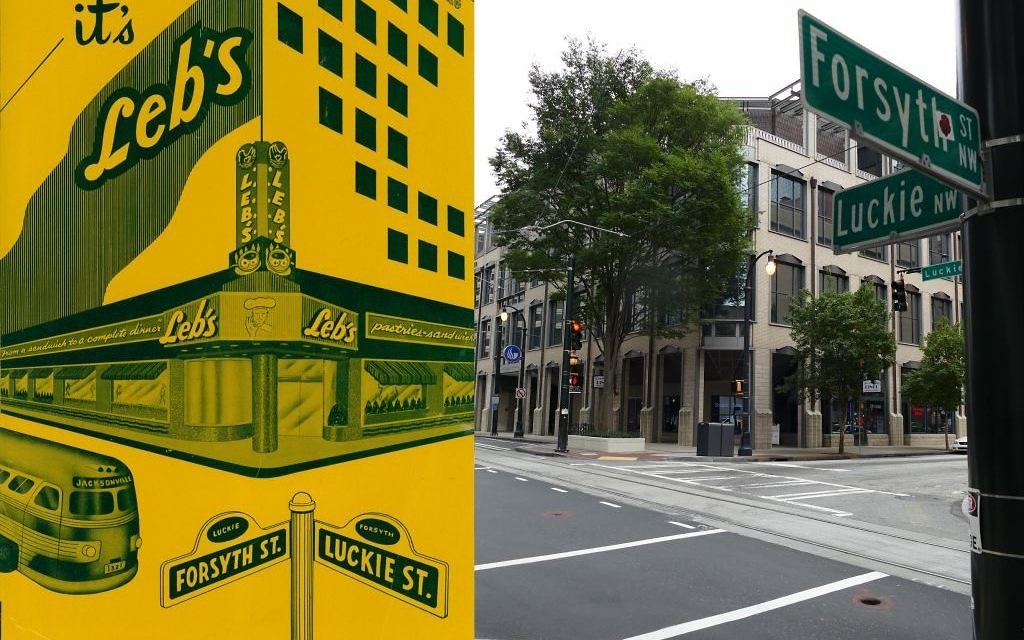Trolley to Tour Jewish Atlanta’s Civil Rights History
This February, the Breman Museum will again run a free historic Jewish Atlanta civil rights trolley tour.

For those who missed the Breman Museum’s historic Jewish Atlanta civil rights trolley tours this year, there are two more chances to learn about the local Jewish community’s impact on the civil rights movement.
Scheduled for Feb. 21 and 25 and led by the Breman’s archives director, Jeremy Katz, the tour will visit six Jewish institutions that played a role in the fight for integration.
“It’s a Jewish perspective on the civil rights movement,” Katz said. “Civil rights is typically seen through the lens of black and white, and this is kind of a third perspective. So we go to these different sites that were involved in both sides of the civil rights movement. Some were for, and some were against integration. It’s one of my favorite tours that we do.”
Get The AJT Newsletter by email and never miss our top stories Free Sign Up
Though coming at a time of increased focus on civil rights and Southern history nationally, the tour developed from the Breman’s new Historic Jewish Atlanta App, which has a section dedicated to civil rights. Thanks to a grant from the Georgia Humanities Council and trolleys provided by the Historic Marietta Trolley Co., the tour is free.
The six stops on the tour:
Leb’s Deli

On July 18, 1962, a full-page newspaper ad for Leb’s Deli urged one and all to attend a celebration commemorating 13 years in business for the Jewish deli. A small group of African-Americans and whites stood outside for three hours, but the deli refused to serve them.
Owner Charlie Lebedin said he would serve African-Americans when other downtown restaurants did so. He later said he did not think demonstrators were being fair to make him a “guinea pig.”
Leb’s integrated in 1964 after the passage of the Civil Rights Act, but it went out of business only a few years later. Today the former Leb’s is a Landmark Diner.
Peachtree Manor Hotel
Built in 1924 by Atlanta architect Neel Reid and his firm, Hentz, Reid and Adler, the five-story Peachtree Manor Hotel became the first integrated hotel in Atlanta after it was purchased by Marvin Goldstein in the 1950s. Today, the former hotel at 846 Peachtree St. in Midtown is a condo building.

Below: The DoubleTree hotel as it stands today.
Americana Motor Hotel
Opened in June 1962 by Marvin Goldstein, the Americana Motor Hotel at 160 Spring St. was downtown Atlanta’s first integrated hotel. It also was downtown Atlanta’s first new luxury hotel in more than 40 years and was crucial for Atlanta’s acquisition of the Milwaukee Braves in 1966 because Major League Baseball required an integrated hotel to accommodate visiting teams.
Guests at the hotel over the years included Richard Nixon, Nelson Rockefeller, Martin Luther King Jr., Elvis Presley and James Brown.
The hotel is now a DoubleTree by Hilton, but after extensive renovations, the management plans to reopen with a throwback theme sometime this fall.
Prior Tire
Owned by native Atlantan Abe Goldstein and opened in 1920, Prior Tire became the first privately owned business in Atlanta to hire black employees in sales positions in 1932. Goldstein was a member of Ahavath Achim Synagogue and served as president from 1942 to 1945.
Today, the former location of Prior Tire at the southwest corner of Peachtree and Pine streets is a parking lot.
Rich’s Department Store
In 1960, Rich’s at 45 Broad St. downtown became a focal point of the civil rights movement. As the largest retail store in the Southeast, Rich’s was the site of many sit-ins and boycotts. Activists including Martin Luther King Jr. thought that if Rich’s integrated, so would the rest of Atlanta’s merchants.

Katz said Rich’s may have had the biggest impact of all on the civil rights movement. “JFK might not have been elected president in 1960 if MLK was not arrested at Rich’s in downtown Atlanta,” Katz said. “JFK, through some back channels, helped get MLK out, and that was right before the election. It swayed a lot of the black voters who had historically voted Republican because that was Lincoln’s party.”
Rich’s former flagship store closed in 1991 and is now part of the Sam Nunn Federal Center.
The Temple

On Oct. 12, 1958, a hate group bombed the northern side of The Temple in response to Senior Rabbi Jacob Rothschild’s outspoken support of the civil rights movement and integration. The bombing sent ripples through Atlanta, which called itself the “city too busy to hate.”
Rather than intimidate Rabbi Rothschild and his congregation, the attack inspired community and government leaders to fight for social justice.
In May, The Temple was honored with the 29th marker on the Georgia Civil Rights Trail.





comments